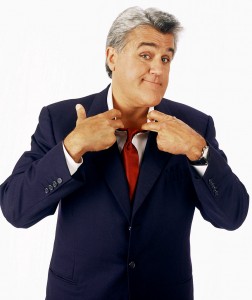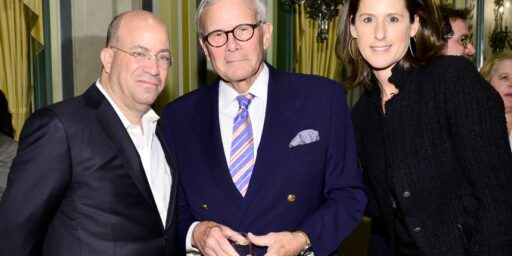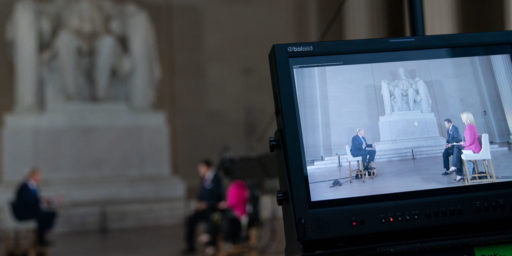TV Networks Need New Plan
 When it was announced that NBC was turning its 10 pm time slot to Jay Leno, I had the same puzzled reaction as most. Brian Stelter, though, argues that we’re likely seeing the future of network television.
When it was announced that NBC was turning its 10 pm time slot to Jay Leno, I had the same puzzled reaction as most. Brian Stelter, though, argues that we’re likely seeing the future of network television.
The programming and viewing habits of the last 50 years — exemplified by the checkerboard of competing programs on the broadcast networks — are being replaced by an Internet-influenced time-shifting model of scheduling. As a result, the very definition of prime time may be changing.
“We do have to continue to rethink what a broadcast network is,” Jeffrey Zucker, the chief executive of NBC Universal, a unit of General Electric, said at an industry conference Monday, hours before the news of Mr. Leno’s new assignment emerged. He warned that if changes were not undertaken, “the broadcast networks will end up like the newspaper business or, worse, like the car companies.” Maybe Mr. Zucker has seen the future; after all, his network has lost 50 percent of its 10 p.m. audience in the last three years.
[…]
Time-shifting of all sorts — a combination of DVRs, Internet video viewing, cable repeats, DVD sales and other viewing patterns — is having a profound impact on all the networks. The always-on nature of content, inspired by the Internet, is freeing consumers from the previously all-powerful schedule. And it is making the networks think more like cable channels, which tend to repeat shows more often.
[…]
Advertisers pay for air time using ratings that include only the first three days of DVR playback, under the assumption that the ads become less relevant over time and that most viewers will watch shows by then. As a result, networks are looking to schedule programming that can encourage live viewing.
On Tuesday, Ben Silverman, the co-chairman of NBC Entertainment, called “The Jay Leno Show” a “killer app,” not only because of the comedian’s talents, but because “you want to watch it that night, and you want to watch it the next night.”
Or, in my case, not want to watch it at all.
But they’re on the right track. Aside from football games and breaking news, I watch nothing “live” anymore. Indeed, I’m only vaguely aware of what networks air the shows I watch, much less the time slot in which they’re broadcast. Everything is either on my DVR or otherwise downloaded to watch at my convenience.
Increasingly, my wife and I don’t even bother watching new shows when they debut, preferring instead to catch them a season or two later on Netflix. It’s actually quite annoying, especially for serial dramas, to be at the mercy of the network’s scheduling vagaries. It’s much more enjoyable to watch the episodes back-to-back in a relative short period.






James,
Perhaps what we need is a TV Bailout program. Typically the formula would be 1 TV czar, and access to the 1 trillion bailout funding.
This way, the government can control what we see, hear, and do, and thus resort to watching Howdy Doody reruns. 🙂
Don’t forget your fallout helmet.
Ya know, I wonder at this a little.
tay with me, here.
Those of you who know me, know I have a very substantial record collection… vinyl. About 22,000 LP’s and I’m not sure how many singles.
For even those with lesser collections, there was a decided relationship in the head between a particular bit of music and those big black plastic things. When they were used, their use was very up front and very visual. The turntables they were played on, at least in the better stereo systems, were often very expensive and visually impressive. Record collectors will tell you that each label, each pressing house and yes, each individual album or single had it’s own unique property, a personality, as you will, that went well beyond it’s content, certainly from a technical point of view, but the aesthetic as well.
Still with me? Good.
Back in the day of over-the air TV broadcasting, there was a decided relationship between the content, and what channel it was on… or network it was on, which local station, each of which also had a personality.
Such was the state of the technology then, that this relationship had the ability to sink in to the national psyche, if you will. Technology was stable enough that such relationships took on, in people’s heads, an almost physical quality.
Music cassettes came along and lessened that relationship by taking the medium out of the line of sight of the listener, while maintaining to an even greater degree of personality quirks in terms of the technological… the playback was iffy at best, usually.
When CD’s came along, that relationship tended to be lessened still further. CD players, after all, are certainly less imposing than the old turntables were. They tend not to have visible motion to them, and if they do it’s certainly not on the scale of the turntable. The technology has removed what physical and technological personality there was in music storage.
MP3 players, still further.
As all this has been going on, the sales of recorded music has been going downhill, amidst complaints that what the labels are turning out is dreckish at best. My guess for that is that when teh technological personality, and the visual connection is gone, all one really has is the recorded matter. When people are forced to listen to the stuff, instead of involving themselves in all the rest of it, they find they don’t like it quite so much, and it doesn’t sell.
All, that said, I wonder if the same trend isn’t true in the largest of senses, in television, and why the networks are having so much problem, these days.
When I reflect back my tv viewing habits, they have changed over the past years. In the mid to late eighties, I used to devote my Thursday night to watching “Taxi, Cheers, and Hill Street Blues.” Then, I watched “The Simpsons” in the early nineties with my young son on early Sunday night.
After that, I weened myself off network entertainment TV. I have never seen a complete episode of “Seinfeld”, never viewed over three minutes of “Survivor.” and lord help me, avoided “American Idol” and such, like some medieval plague.
The only network tv I watch these days is when either College or Pro football is being broadcast. Otherwise, I am watching the variety of channels on cable, both news and entertainment.
There are too many alternatives out there these days network tv. Cable channels, Internet sites, such yours, and even personal communications devices, which make a 6:30pm newscast and laugh-tracked productions out-dated and boring.
Everyone has a different taste for entertainment and News, mine changed over the years. Broadcast networks, like car companies are driving over the cliff, in slow motion, with all that dramatic music in the background.
Kinda sounds like the Marshal McLuhan metaphor for the music industry and its interaction with the public.
That’s good.
Until they start running porn on network TV–I ain’t watching. Tipper Gore and Joe Lieberman, be damned!
Yeah, I guess so… but dive deeper here.
Back when Stereo was a new thing, folks would buy what were called Demonstration records. The recorded material was technically brilliant, but musically was laughable at best, usually, and barely listenable… but because the technology was so flashy, they got listened to. Once the new wore off the technology, people recognized the reason they bought the stereo systems in the first place was music, and found a lot of early stereo recordings lacking listenability.
Tying this back to the topic.. the technology has become not just ho-hum but is now all but invisible. Remember when HBO was such a great thing? We’ve gone beyond even this… When there’s 200 networks tied to your system, you’re far more interested in the programming than any identification with the medium.
Ennui is the issue if you stick with the traditional broadcasting model. For televisions to be watched, they must bring something new, exciting, and inventive in order to make us sit there every week at a proscribed time slot.
With any product, the technology component plays a part. However, if you want returning customers (for a product that you do not eat or drink), you must excite them. If you want to maximize the customer base then access to your product is vital.
There is plenty of competition for our attention today. TIVO does well because you are not forced to be at place ‘A’ during time ‘B’ to watch the content you want. Broadcast networks greatest strength is geographical availability. Their greatest weakness is content access.
“On demand” and “point of use” should be acknowledged as desired consumer features… (although you can still get my attention with something original and inventive in your domain).
ABC, CBS, and NBC websites that “broadcast” programs any time day or night at the click of a mouse is good. I would advocate that network programs with commercials are free to the public and that viewing without commercials is a subscriber service. (Ever hear of that concept in the past 25 years?)
You’re being kind (but, then, my musical tastes were forged in the 50s and 60s–you know, when people could actually play their instruments).
On the future of the networks, the execs might want to revisit Marketing Myopia and ask themselves just what business they are really in.
Well, I don’t know. I gave up on tv back in the 80’s (except for sports)(and PBS). In the 90’s I gave up on it altogether. Why have a tv, when I only watch it for 2 hrs on thursday nights? (watching a baseball or football game became an exercise in frustration with the broadcasters and the producers)
These days, I watch NOVA, Frontline, and the Daily Show as I feel like on the internet (once or twice a week) The rest of it?
I can watch it off of netflix in a couple years… if it is worth it.
I’ve been watching old episodes of Emergency! from the seventies recently on Netflix. Since those were on, TV programs have lost 10 full minutes of program time, which goes to ads. I hate the ads, and as my mother put it “by the time the program has come back on, you’ve lost track of the plot.” But part of what we’ve lost is TV personality quirks that aren’t plot driven. Because there is so much less time, we’ve lost a lot of those little moments that weren’t necessarily to drive plot, they were just things characters did. I miss those. Now, the character traits are overdone, until you don’t like the character anymore.
Ironically, the old show Degrassi High – and I’m told the Next Generation – did a good job of building long-term multi-year arcs, which weren’t overdone. Fights changed relationships, people did awful things to others and were sorry, and took a long time to make it up to people. But it wasn’t the be-all and end all of the emotional life of a show. Instead, it was just there – the way it is in real life.
Subtlety is lost. Cheers was a filler comedy, which didn’t find an audience for three years. Now, the networks don’t stand for it. Look at Jericho, which was a great drama, which was ruined by the need for instant ratings. The second season was so cliched and unsubtle— corporations run by evil white guys ruined the paradise of eden for the rest of us — it was unwatchable.
Someone suggested a long time ago for Firefly a different model of TV development. They suggested that Joss Whedon take orders for a second season at $40 for a DVD set, until he had enough to write and shoot it. I certainly would have bought one for myself, and a couple for other people as gifts. Even if it had been $120, I would have done it. Maybe that will be the new formula. Have all the pilots shot, maybe a first few episodes filmed, air them, and get people to pay for a subscription, and wait until you have enough to pay for the rest of the season.
“It’s much more enjoyable to watch the episodes back-to-back in a relative short period.”
I agree, and that’s how I tend to do things. I’ve just recently started watching “House” on USA Network and it’s so much more satisfying to see the arc of the stories play out back-to-back.
HOWEVER, there’s obviously a huge downside to that style of viewing. If everybody goes that route, no show will exist long enough to generate a whole string of episodes. Without those early ratings, there can only be quick cancellation and no show to watch later – even a good show.
Hey TV network guys, sayonara, and don’t let the screen door hit you in the butt.
James: Much like you, my live TV watching consists of football games and some news (usually only local news to catch the weather forecast, which is invariably wrong, anyway). I can’t remember the last time I watched a ‘show’ of any kind; I bet it’s been over 20 years, at least. I long ago lost my patience for the endless, mindless commercials. It’s hard enough for me to watch the endless, mindless commercials during football games, so I switch between games during commercials. I am amazed network television still draws audiences in the millions; can’t imagine what they find worth watching for 13 minutes in each half-hour segment. Gotta wonder.